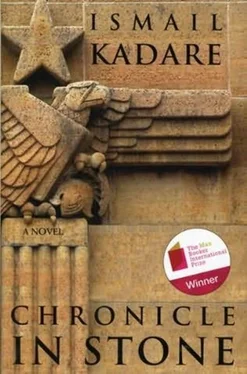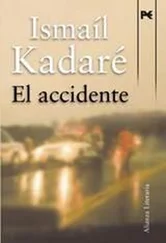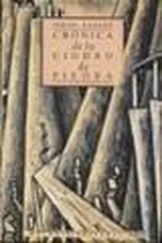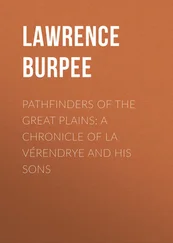Ismaíl Kadaré - Chronicle in Stone
Здесь есть возможность читать онлайн «Ismaíl Kadaré - Chronicle in Stone» весь текст электронной книги совершенно бесплатно (целиком полную версию без сокращений). В некоторых случаях можно слушать аудио, скачать через торрент в формате fb2 и присутствует краткое содержание. Жанр: Современная проза, на английском языке. Описание произведения, (предисловие) а так же отзывы посетителей доступны на портале библиотеки ЛибКат.
- Название:Chronicle in Stone
- Автор:
- Жанр:
- Год:неизвестен
- ISBN:нет данных
- Рейтинг книги:4 / 5. Голосов: 1
-
Избранное:Добавить в избранное
- Отзывы:
-
Ваша оценка:
- 80
- 1
- 2
- 3
- 4
- 5
Chronicle in Stone: краткое содержание, описание и аннотация
Предлагаем к чтению аннотацию, описание, краткое содержание или предисловие (зависит от того, что написал сам автор книги «Chronicle in Stone»). Если вы не нашли необходимую информацию о книге — напишите в комментариях, мы постараемся отыскать её.
Chronicle in Stone — читать онлайн бесплатно полную книгу (весь текст) целиком
Ниже представлен текст книги, разбитый по страницам. Система сохранения места последней прочитанной страницы, позволяет с удобством читать онлайн бесплатно книгу «Chronicle in Stone», без необходимости каждый раз заново искать на чём Вы остановились. Поставьте закладку, и сможете в любой момент перейти на страницу, на которой закончили чтение.
Интервал:
Закладка:
Was it really him?
Two or three times I went up to the mirror and, after making it go misty with my breath, put my lips on its ice-cold surface. The shape of my kiss remained clear. It was a cold, joyless kiss, redolent with death.
I tried to summon up the face of the boy as I had seen him the other day, up in the fortress. I tried especially hard to remember his lips, which had caught my eye that day more than anything else about his face. They were special lips: lips that had already kissed.
The days went by with nothing to report. A person was looking for the body of another, whom he had once kissed. That was happening somewhere deep down, under the ground. Up above, everything was as before. The days were heavy and shapeless. All identical. Soon they would lose their one remaining distinction, the names that sheltered them like snail shells: Monday, Wednesday, Thursday.
Nothing happening. Wednesday and Thursday went by. Then Frisatsunday. The days stuck to each other like lumps of sticky dough. Finally, on Tuesday, something happened: after the rain, a little rainbow came out. In our city spring came from the sky, not from the soil, which was ruled by stone that knows no seasons. The coming of spring could be glimpsed in the thinning of clouds, the appearance of birds, and the occasional rainbow. This one rose up inside the city itself. Strangely, one end of it rested on the brothel, the other on Aunt Xhemo’s house, which was nonetheless considered one of the most respectable houses in town.
“Kako Pino, go out and look,” Bido Sherifi’s wife called out.
“It’s the end of the world,” Kako Pino said. “Selfixhe, come and look!”
Grandmother looked and shook her head.
After the rainbow nothing happened for a whole week. Then one day Ilir said to me, “Isa and Javer are going to do something.”
“What?”
“I don’t know. But I heard Javer saying: ‘We have to break the peace and quiet of this petty-bor… petty-boar…’ I can’t remember the word.”
“Could they have meant to say pretty-boring?”
“No, it definitely wasn’t that.”
“I don’t believe it,” I said.
“Why not?”
“Remember their death list? How come they never did anyone in?”
“Who knows? There might have been a good reason.”
“They won’t do anything now either.”
“I’m sure they will.”
“Yiorgos Poulos changed his name back to Giorgio Pulo. Why don’t they shoot him?”
“Do you want to bet they’ll do something this time?”
“OK.”
“I’ll bet France and two Switzerlands against Madagascar.”
“It’s a deal.”
Three days later I lost the France and two Switzerlands. Something serious happened all right: the town hall burned down. Very early in the morning we heard gunfire, then, coming from the street, people shouting: “The town hall is burning! The town hall is burning!” Shutters flew open. Heads, hands and arms stretched out as if they wanted to catch the news while it was still in the air. And it was true, the town hall was really going up in flames. Thick smoke like a herd of black horses was rising over the massive building and being blown around by the wind. Tongues of fire glowed red here and there against the black. Footsteps rang through the streets, then a hoarse voice shouted, “The title deeds are burning!”
“The deeds?” a woman asked from her window.
The hoarse voice kept shouting, “Citizens, come out, the town hall and the deeds are burning!”
“What are deeds ?” I whispered.
No one answered.
The sound of footsteps in the street turned to thunder. I took advantage of the confusion to slip out. Mane Voco’s house was nearby. Ilir opened the door.
“Did you bring the France and two Switzerlands?” he asked as I came in.
“Don’t worry. I’ll give them to you. But wait a minute. What’s going on?”
“It burned down. It’s gone.”
“Was it them?”
“Of course. Who else?”
“Where are they?”
“In their room. Pretending to be surprised, to know nothing about it.”
“What are deeds?”
“I don’t know.”
“Come in and close the door!” Ilir’s mother shouted from upstairs.
We went upstairs. Ilir knocked on his brother’s door.
“Can we come in for a minute?” he asked.
We went in, first Ilir, then me.
Isa and Javer were both there. They were standing at the window watching the fire. They said something to each other in a foreign language.
“Strange,” Javer commented. “I wonder who started the fire? What are they saying over at your place?” he asked, turning to me.
“Yes, very strange all right,” Isa agreed.
“I was having a nice dream when the shots woke me up,” said Javer.
“Me too,” said Isa. “I was dreaming about flowers.”
There were shouts from the street.
“What are deeds?” This time it was Ilir who asked the question.
“Ah yes, deeds,” said Javer. “Can you hear them weeping and wailing over their precious deeds? Deeds are documents saying who is the owner of things like houses, yards and land. Understand?”
It was hard to follow. They both tried to explain it to us.
“All the information about property is written down in the deeds: where it lies, who inherits it from one generation to the next, things like that. Have you got that into your thick skulls? Everything is written down – the cistern, the fig tree in the back, the mortgage your father took out, and even you…”
Out in the streets, the shouts were getting louder and louder.
“Listen to them bleating,” said Isa. “The monster of private property has been wounded.”
A shrill cry rose above the general clamour.
“Lady Majnur,” said Javer, leaning out to hear better.
Lady Majnur had run into the street without her hat. The wisps of grey hair that poked out from under her black headscarf made a terrifying sight. Her shouts were punctuated by fragments of words and sprays of spit.
“The rabble!… It’s the debtors who set fire to the title deeds!… Communists!… Criminals!…”
“Scream, you old witch! Scream your head off, you old whore!” Javer snarled.
I plastered my face to the windowpane and looked out at the teeming street. Now and again the pane misted over. The land and houses, now they were free of the weight of their deeds, began to shift, wander and come apart. The walls seemed to part from their footings, and the age-old ties that had held them in place for so long seemed to have come asunder. As they drifted about, the great stone houses sometimes came dangerously close to each other. They could easily collide and destroy themselves, as they did in earthquakes.
“They’re burning, they’re burning!”
Only the streets, which belonged to everyone, tried to keep their heads in the uproar.
The chaos went on for a while. Smoke now rose more languidly from the burned-out building. The windows, from which flames had been leaping furiously only a short while before, had now begun to go dark.
“The Reichstag went up in flames as well,” said Javer, pointing to a place on the globe.
“Who burned it?” Ilir asked.
“Who? Arsonists, obviously,” Javer said.
“Every city in this world has a building that should be burned,” Isa said.
Javer smiled. A moment later he gave such a yawn he could have dislocated his jaw. He had rings under his eyes.
Isa was yawning a lot too. Neither tried to hide the fact that they hadn’t had a wink of sleep. I felt sure that if you got up close to them, they would smell of kerosene.
Outside the streets had almost settled down. I went out.
That night someone was arrested in our street. There were loud knocks at someone’s door, knocks that didn’t sound like the usual ones, and they woke up half the neighbourhood.
Читать дальшеИнтервал:
Закладка:
Похожие книги на «Chronicle in Stone»
Представляем Вашему вниманию похожие книги на «Chronicle in Stone» списком для выбора. Мы отобрали схожую по названию и смыслу литературу в надежде предоставить читателям больше вариантов отыскать новые, интересные, ещё непрочитанные произведения.
Обсуждение, отзывы о книге «Chronicle in Stone» и просто собственные мнения читателей. Оставьте ваши комментарии, напишите, что Вы думаете о произведении, его смысле или главных героях. Укажите что конкретно понравилось, а что нет, и почему Вы так считаете.












